Author: Mary Grissett
5 PPC Business Ethics Examples and Best Practices
It’s no secret that competition in online advertising has become super stiff. In a bid to beat the competition, it’s easy to cross the line and employ shady tactics; tactics that may be unethical.
However, unethical PPC practices will do more harm than good for your business. They can also get you in trouble with the law.
That’s why as a digital marketer, you must always prioritize business ethics in all you do, including in your PPC ads.
Business ethics play a huge role in the success of your business. That’s why today, I want to focus on the topic from a PPC ads perspective.
The Importance of Business Ethics in PPC Ads
Business ethics refers to the moral principles that serve as guidelines for the way you conduct business. This includes everything from how you attract customers (via advertising) to the way you transact with them and everything in-between.
Business ethics are based on values like honesty, fairness, transparency, and social responsibility. An ethical marketer builds their PPC campaigns based on both moral and business perspectives.
In short, your PPC campaigns must help your prospects, not trick them into making a purchase, and they should also benefit your business. For some, walking this fine line is the most challenging aspect of running effective PPC ads.
Now, what’s the importance of business ethics in PPC ads?
Business Ethics Help You Build Strong Relationships With Customers
One of the most important reasons to practice business ethics in your PPC ads is to help you build strong relationships with your customers. People trust ethical brands as they’re authentic and transparent. They know they’ll get exactly what the brand promises in its ads.
As a marketer, put people before clicks (and profits). It will help you build strong relationships with your customers, leading you to enjoy higher retention rates.
Business Ethics Help You Develop a Good Reputation
Your reputation is one of your most important assets as a business. Two good reasons you must prioritize having a good reputation include:
- Create brand ambassadors: When a person clicks on your ad and gets a positive experience, they’re highly likely to recommend your brand to their family and friends.
- Improve your ad performance: Your brand’s reputation has an impact on the performance of your ads. Many users perform their own brand research before deciding to make a purchase. In today’s highly connected age, a poor reputation easily shows in the form of negative reviews.
Every business needs a good reputation to thrive, especially in a competitive environment. And good reputation management starts with employing good business ethics in all your activities, PPC ads included.
Ignoring business ethics in your PPC ads can only lead to wasted ad spend and a ruined business. With that out of the way, let’s quickly dive into the top five ethics you should follow as you create and run your PPC ads.
5 Examples of Business Ethics Principles You Should Follow in Your PPC Ads
To ensure your PPC ads follow business ethics principles, here are five best practices to keep in mind:
1. Don’t Advertise Misleading Products
One of the most unethical practices you must avoid as you steer your business towards ethical practices is giving your customers misleading information. Sadly, this is a common practice in the advertising industry, and some brands still utilize misinformation in a desperate bid to drive clicks. The internet abounds with examples of misleading ads; yours shouldn’t be one of them.

One of the most common examples of misinformation in PPC is advertising misleading products. This could be anything that includes:
- advertising products you can’t supply
- using a high-traffic keyword that’s not relevant
- using hype to infer your product does what, in reality, it doesn’t
There are many more ways unethical advertisers use misleading information to drive clicks. However, no matter how desperate you are to get people to click on your ads, don’t mislead your customers.
While you may get the clicks you want, the long-term effects of such unethical business practices are not worth it. For one, you’ll lose your customers’ trust. Even if they click on your ads, they’ll be so disappointed they won’t purchase what you’re selling.
No matter what products or services you’re advertising, be honest about the features and benefits. There are always people looking for what you have to offer.
Exaggerating the benefits of your product or service is tantamount to making a false claim. Promising your prospects a level of quality you can’t deliver will only ruin your reputation.
2. Only Include Honest Links in Ads
Business ethics, especially in PPC, demands that the message in your ads and the link destination must match.
Anything else is dishonesty.
Unfortunately, many unscrupulous businesses send people who click on a link in their PPC ads to a different destination. They advertise one thing and send visitors to a different landing page. Pulling a bait and switch like this goes against good business ethics. More than that, it leads to you losing your integrity as a business.
Besides the loss of integrity, dishonest links can lead to you being penalized for unethical practices. When your link takes customers to a page unrelated to what you’re advertising, your ad is considered a fake ad, and Google will take it down.
Dishonest links are prevalent among marketers who get paid using the cost-per-impression (CPM/CPI) model. They try to rack up impressions on their ads by creating their ads around popular keywords that attract a lot of traffic. When users click on the link, they’re directed to a different product or business.
As an ethical marketer, such tactics should never even be mentioned in your strategy and planning sessions. No matter how competitive your space may be, stick to ethical business practices.
3. Sell Your Products at Fair Prices
While some business ethics are clear-cut, others are not. Ethical pricing is one of those that isn’t so obvious.
If you’re wondering, ethical pricing means charging an amount that’s fair for your products.
It’s pricing your products in a way that allows you to make a profit without defrauding your customers. Doing so is not always easy as there are many factors that you have to consider to price your products fairly. The most significant are:
- market factors
- your competitors’ pricing
- availability
Besides fair pricing, you must also ensure to practice ethics in your PPC ad campaigns as a marketer. Make sure you’re fully transparent about all the costs your customers will incur when purchasing your product or services. There’s nothing as frustrating as thinking you’ve found the best deal on a product, only to click on the ad and discover the advertised price wasn’t genuine.
From shipping to discounts and everything in between, your ads must be clear about the final price your customers will pay for your product. Doing so is essential to building trust with your customers. It’s also critical to reducing cart abandonment as undisclosed shipping costs are one of the leading causes of cart abandonment.
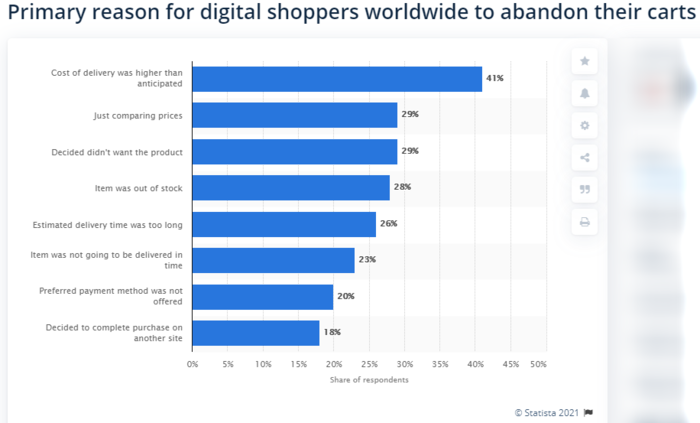
The bottom line is, sell your products at a fair price and make sure you’re transparent about pricing in your PPC ads and landing pages.
4. Don’t Plagiarize
As a marketer, you probably look for inspiration from ads that have performed well, but that’s as far as competitor research should go.
Never plagiarize other brands’ ad copy.
For your brand to do well online, you must follow Google’s search evaluator guidelines, the most significant being the EAT guidelines. Google’s EAT guidelines have a huge bearing on how you ethically create your PPC ad copy. Here’s what the acronym stands for and what it means to your ad copy creation:
Expertise
Your ad copy must reflect your expertise in your niche or industry. Show your customers why you’re the best. However, make sure not to stretch the truth as that would be dishonest and unethical.
Authoritativeness
People want to buy from brands that have built a reputation for themselves. A good reputation is born out of practicing good business ethics. Let your authority shine through every piece of content in your sales funnel—especially your ad and landing page copy.
Trustworthiness
Trust is one of the most significant factors that drive clicks to your ads. To build trust with your audience, you must be authentic. Avoid plagiarizing other brands’ ads or any other assets that have had a positive impact on their ads.
With so many brands vying for the same customers, authenticity and originality are essential to helping you stand out from the crowd. Following Google’s search evaluator guidelines will help you ensure your content does just that.
Your ad copy will have your unique personality and highlight your particular area of authority, thereby allowing you to attract your ideal buyer persona. More than that, it will help you rank well and drive clicks to your offer.
5. Don’t Use Click Fraud
One of PPC’s strengths has become a loophole that devious marketers now exploit. Yes, I’m talking about the cost-per-click (CPC) model and how some marketers commit click fraud.
What is click fraud?
Click fraud is when an individual exploits PPC ads by repeatedly clicking on them to generate fraudulent charges. As a result, the advertiser’s ad spend shoots through the roof while their conversion rates tank. Not to mention that crucial data said advertiser uses to create better iterations of their campaign gets skewed.
The main reason unscrupulous marketers leverage click fraud as part of their business strategy is to exhaust their competitor’s ad budget. Once their budget is spent, their ads will decrease, giving the unethical marketer a better shot at driving traffic to their ads.
Marketers also sometimes use click fraud on their own ads to “game” paid search advertising. By generating more clicks on their ads, they boost their quality score on Google Ads.
Your quality score depends on many factors, with the main two being ad relevance and the click-through rate (CTR) the ad generates. Both are factors that can be manipulated through click fraud.
Why would a publisher commit click fraud on their ads?
Simple. A good quality score is critical to marketers as it results in:
- lower CPC
- lower acquisition costs
- better rankings for ads
While the advantages of having a good quality score are massive, you shouldn’t stoop to click fraud to get them. Improve your score as best you can, but make sure it’s within the confines of good business ethics.
Business Ethics in PPC FAQs
Using hype in your ad headlines is unethical. It’s the same as clickbait and should never be used to move people to click on your ads.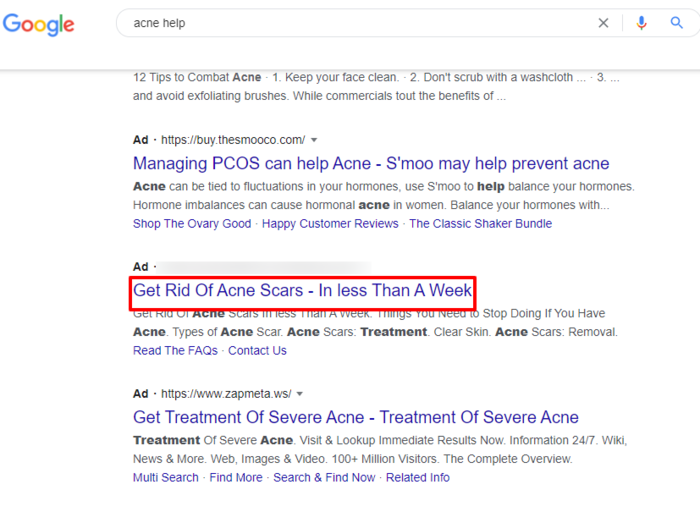
Instead, use benefit-driven headlines as they’re more truthful. They also address your target audience’s pain points, resulting in better conversions.
The type of foundation you lay for your business determines its outcome. Once you start using unethical business practices, you’ll use them every time you need a “quick fix.” So, yes. It’s wrong to manipulate clicks at any stage of your business, even for the sake of just gaining traction.
Business Ethics Conclusion
Despite the economic atmosphere being cutthroat, you must ensure you conduct your business ethically.
That’s especially true for your advertising tactics.
People don’t like being scammed, and unethical PPC ads fall on the dark side of false, misleading, and spammy advertising. While you may initially get some traction using deceptive advertising, you won’t succeed in the long run.
To build a sustainable business, you can only do so based on implementing good business ethics. Be ethical on social media, in your content, your PPC ads, and everything else you do to boost your business. This way, you’ll be able to build a good reputation and grow your loyal repeat customers.
What other business ethics examples and best practices do you think PPC advertisers should follow?
7 Instagram Contest Ideas to Grow Brand Awareness
Instagram accounts that hold contests can achieve up to 70% faster follower growth than accounts that don’t hold contests.
If you want a popular Instagram account, coming up with and executing some Instagram contest ideas is a great start.
In this post, we’ll explore how you can use Instagram contests to raise brand awareness for your business.
We’ll also dive into some of the best practices to keep in mind when running your contests.
By the end, you’ll know how to run a successful Instagram contest that will bring your business the attention it deserves.
Why Instagram Contests Are a Good Idea
There are other ways to get more Instagram followers, of course, but few other methods can increase your follower numbers so quickly, and with such minimal effort.
Not only that: Instagram contests can also help you achieve more engagement.
Posts that are related to Instagram contests tend to earn roughly 64x more comments and 3.5x more likes when compared to ‘normal’ content.
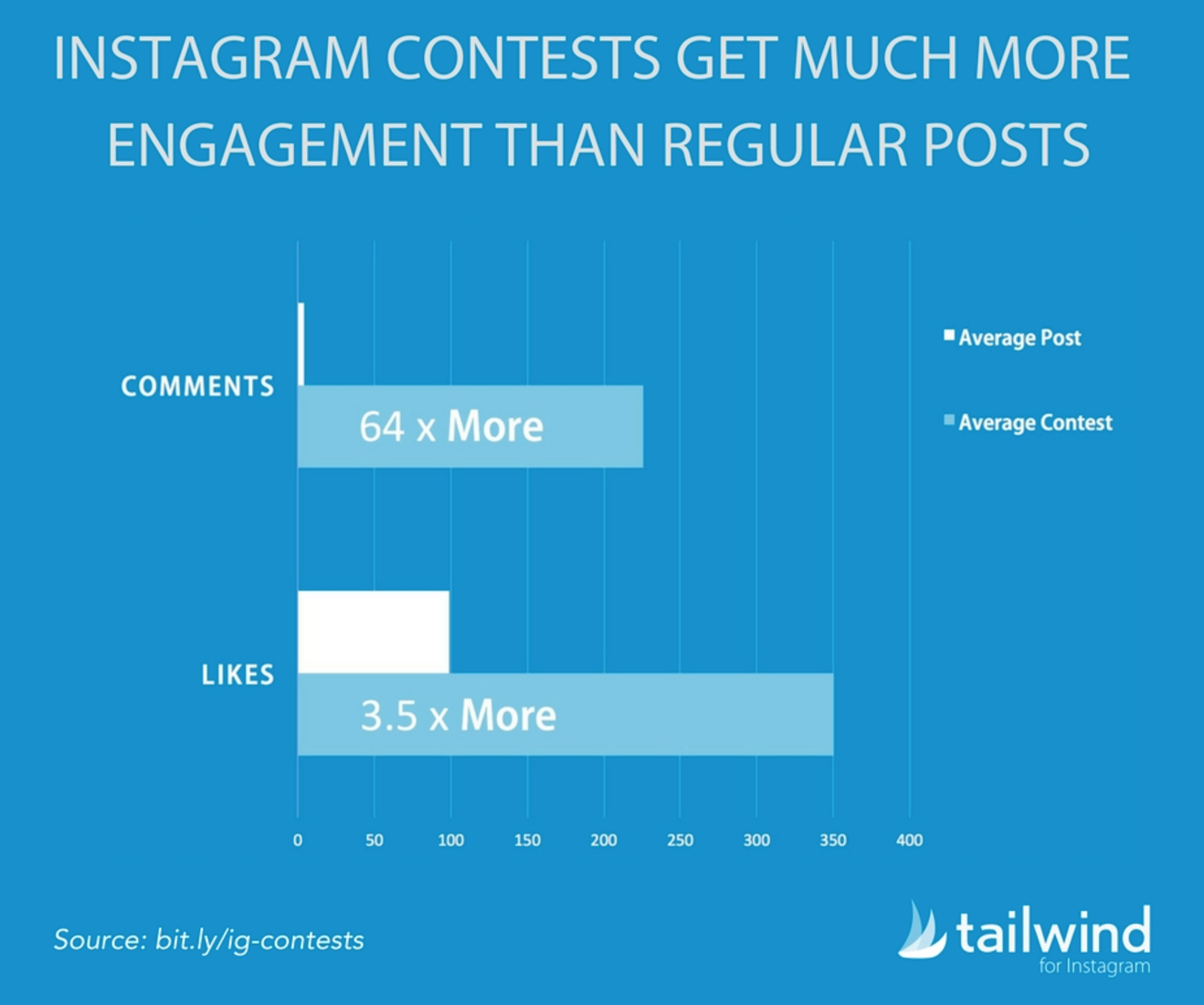
On top of that, 91% of the posts that have achieved 1,000+ comments are contests.
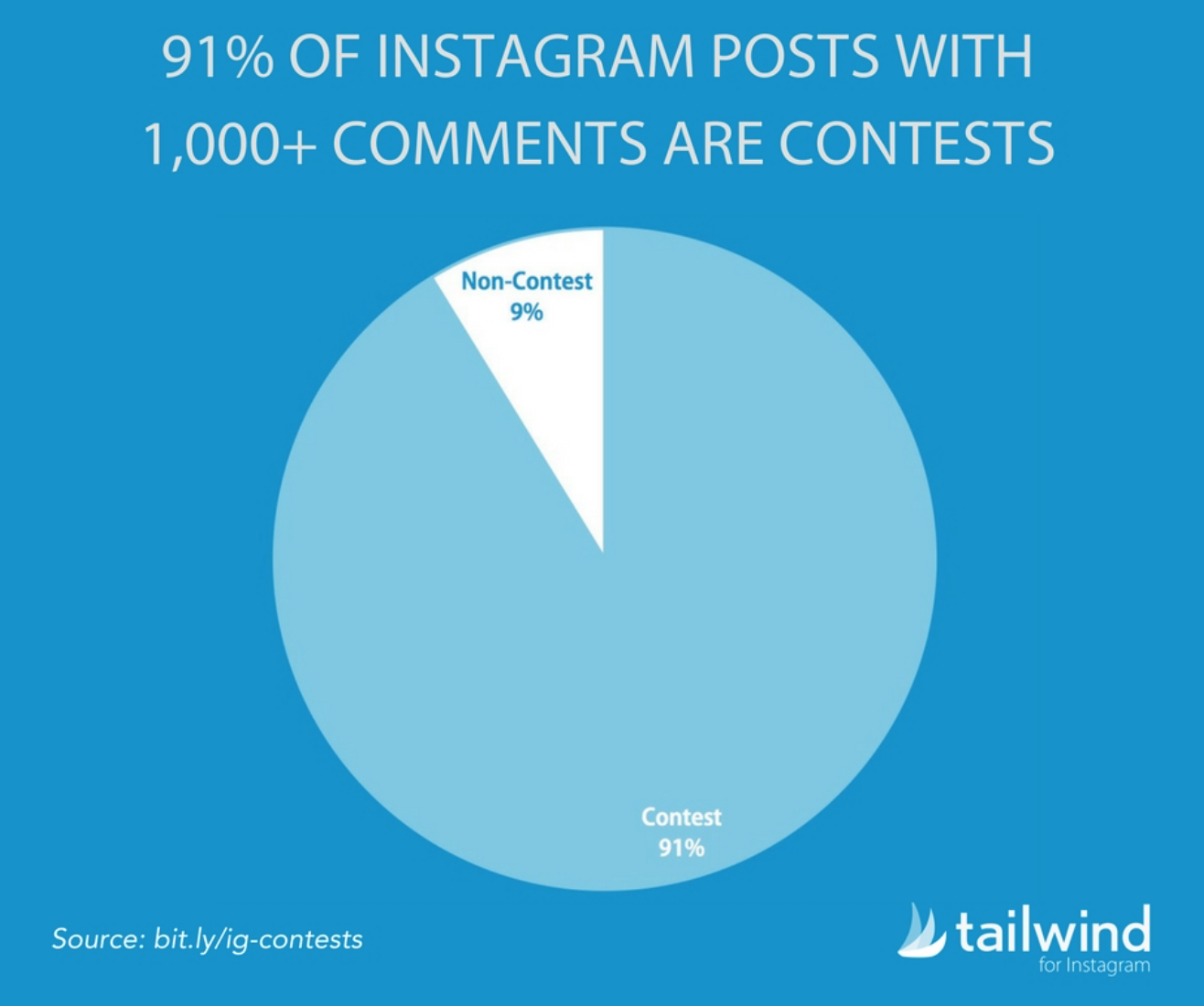
All of these stats show that running Instagram contests is one of the best ways to improve brand awareness.
If you’re worried about being stuck in a cycle of constantly churning out contests, all in the name of boosting brand awareness, don’t worry; you don’t need to continuously run contests to reap the benefits that good Instagram contest ideas can offer.
That’s because you’ll notice a trickle-down effect on the rest of your normal content as a result of running contests. People will feel a greater affinity toward your brand due to the goodwill you’ve generated with your contests.
As a result, they’ll be more likely to share and engage with your normal content.
Plus, because contests generate more followers, there will naturally be more people exposed to your content. This increases the likelihood that share and engagement levels will be higher than ‘pre-contest levels.
Best Practices for Running Contests on Instagram
Before you run your first contest, you need to be aware of some important best practices. Failure to follow some of these best practices could mean that you’re going against the rules of Instagram.
It could also lead to your contest producing lackluster results, which can amount to a lot of wasted effort.
What are these best practices?
The first is to make sure that you write a clear and detailed description for your contest.
When writing the description for your contest, be sure to cover:
- What the rules are
- What people need to do to be eligible
- Any restrictions on who can enter
- The prize
- The deadline
- When you will announce the winner
Doing things this way makes it easy for you to stay on the right side of the promotion guidelines provided by Instagram.
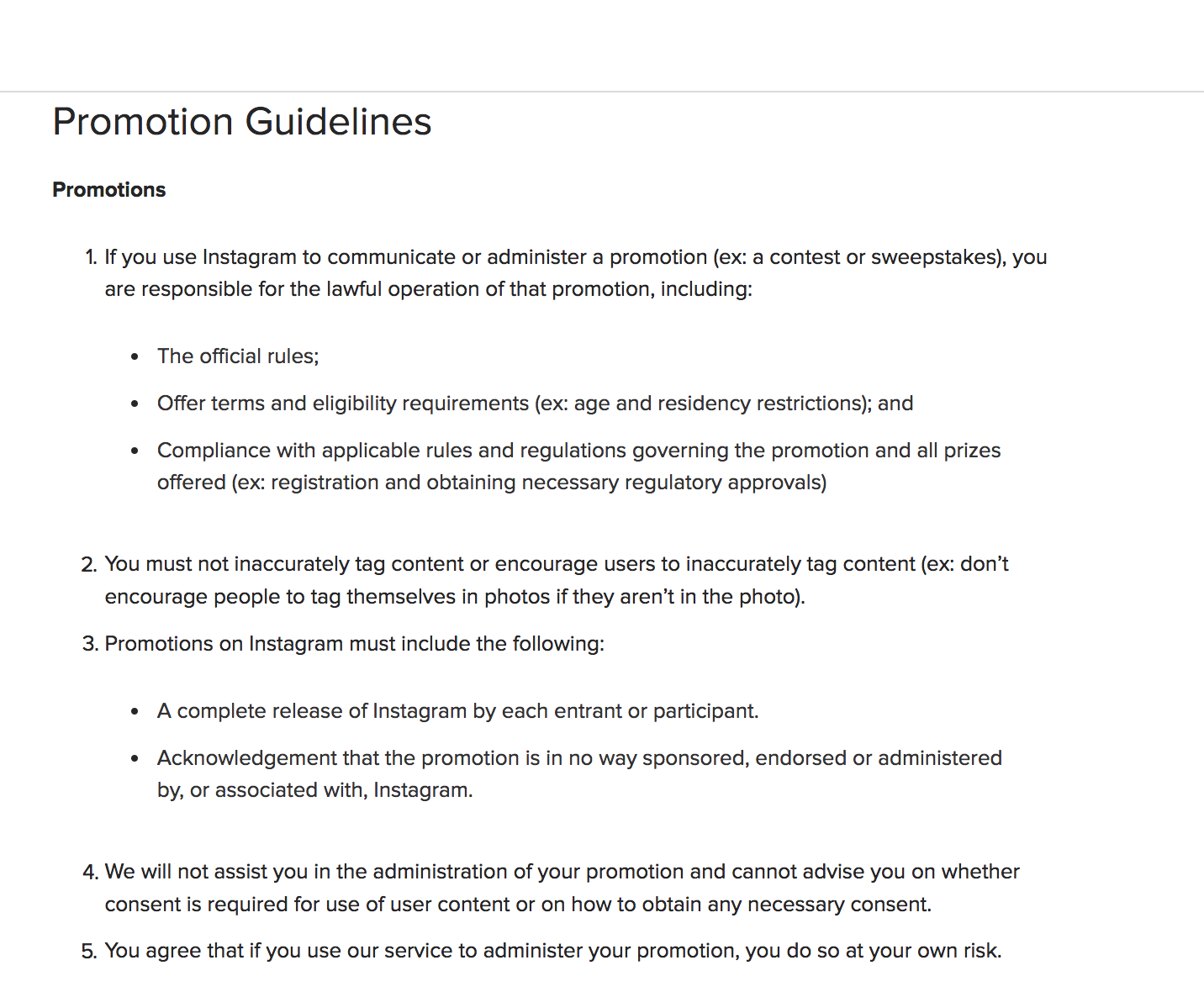
It is important that you don’t stray from the guidelines, as doing so could put your account at risk.
Here’s a great example of a contest description.
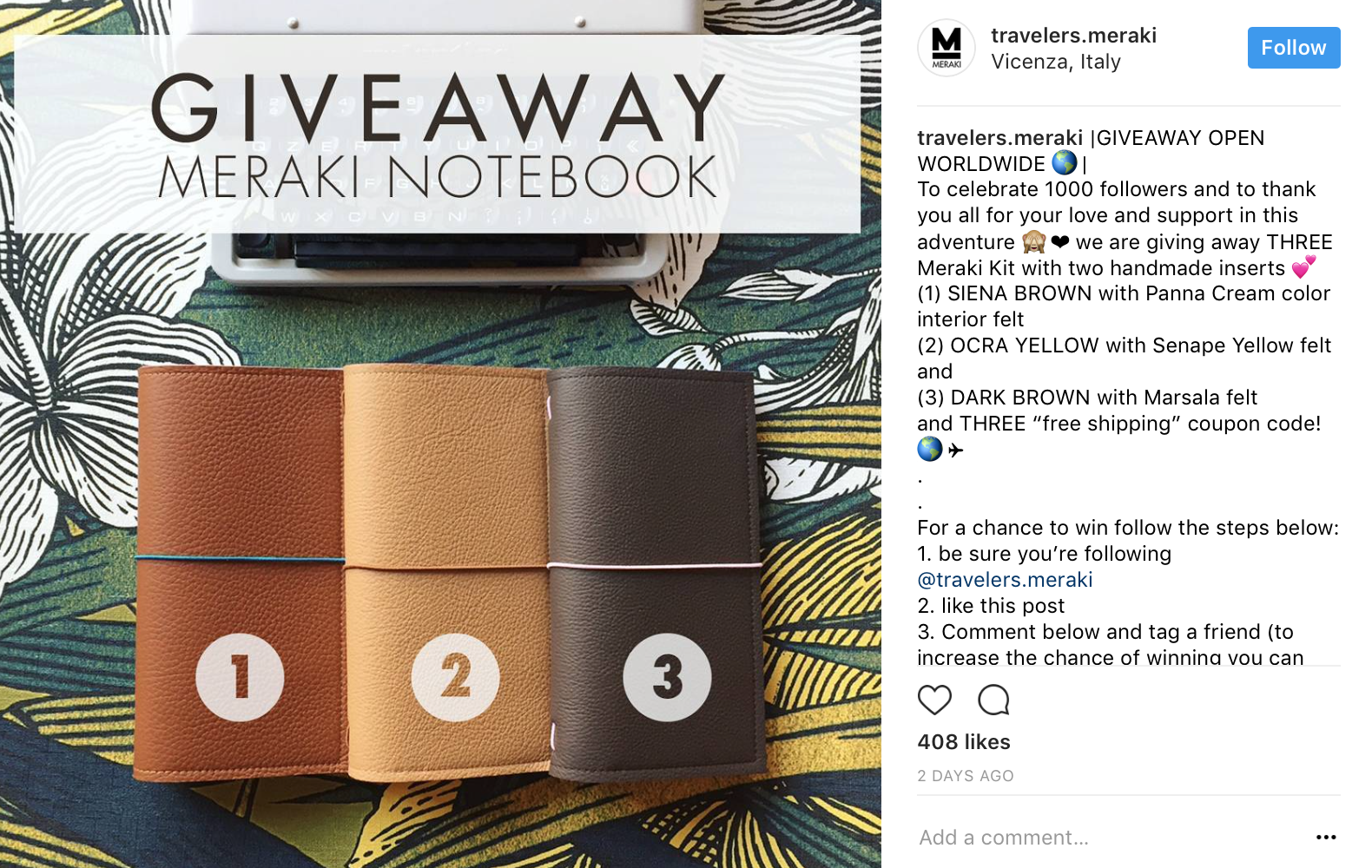
They’ve done a good job of making this detailed, so it’s difficult to fit into one image.
Here’s the first part, which helps establish a reason for the competition while also describing what’s on offer.

This second part does a good job of letting people know what they need to do to be eligible to win.
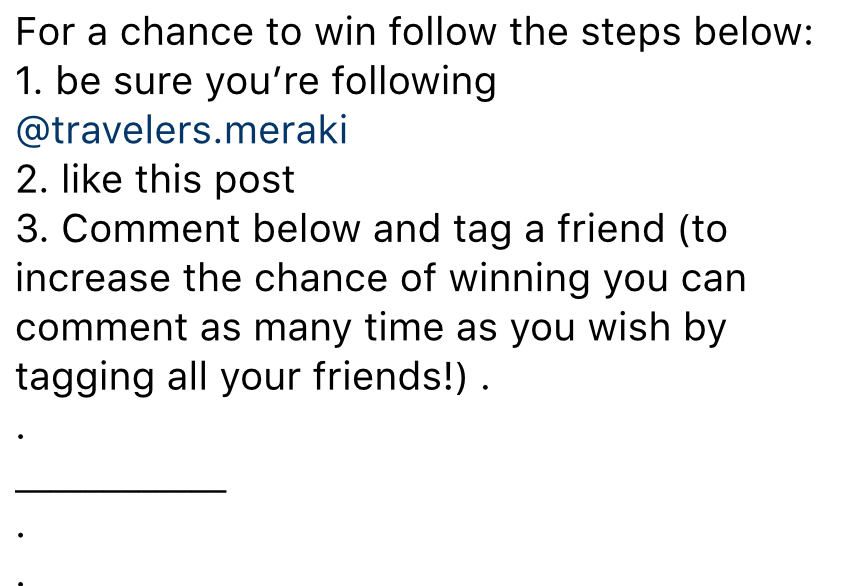
The next bit tells people how they can gain an extra entry. The terms of the contest are clearly shown, while also indicating how the winners of the contest will be announced.
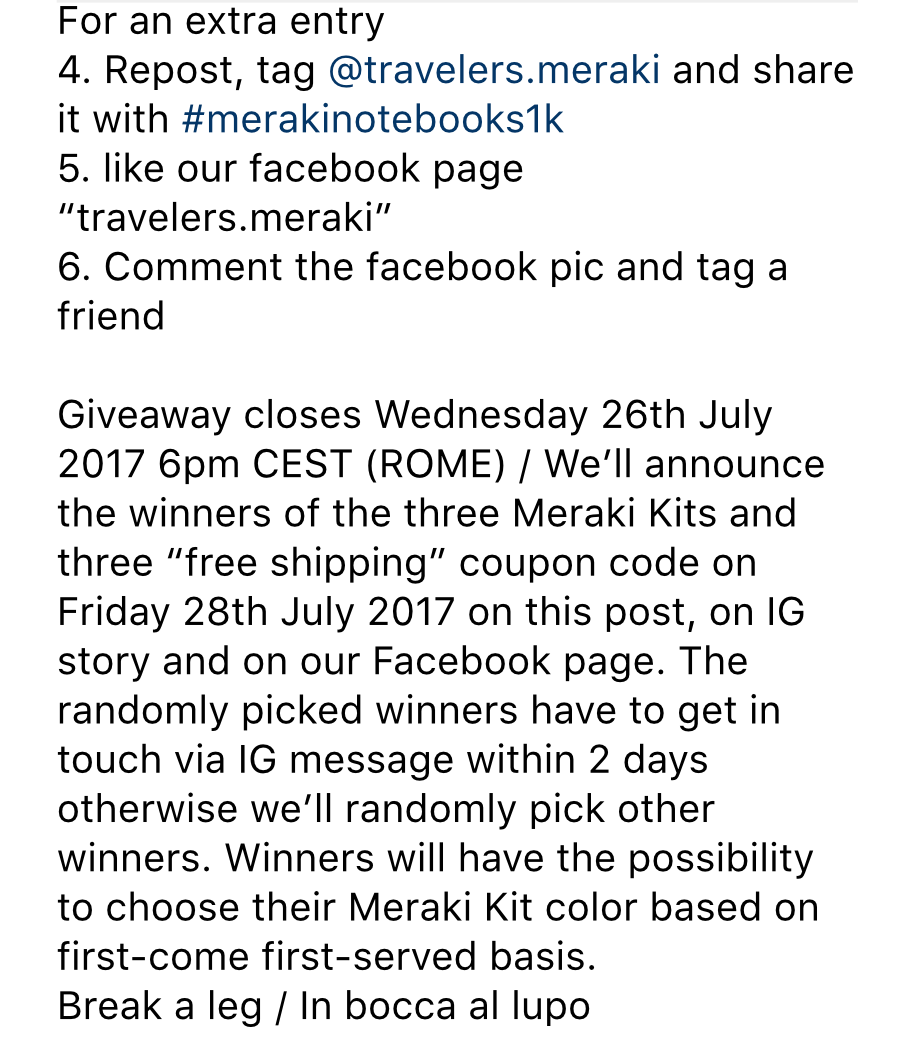
By studying how others are writing their contest descriptions, you’ll learn a lot about what separates a bad description from a good one.
You also need to ensure you’re giving away relevant prizes that your target audience will feel compelled to have.
If you focus on giving away prizes that are relevant to your target audience, your contest will generate better results.
If the products you’re giving away aren’t specific to your target audience, you run the risk of attracting followers that don’t care about your business or the products or services it provides.
In the long term, this arguably does more harm than good.
Such individuals may unfollow your account after a contest, or simply not engage with your profile in the future.
By picking the right prizes, you can reliably attract the right kinds of followers and generate brand awareness among the best demographic for your business.
All of which helps increase the odds of you earning a return-on-investment from your efforts.
As you might have guessed, giving away items of high value tends to produce higher levels of engagement.
The chart below shows that prizes worth $1,000 or more generally achieve 5.8 engagements per 100 followers.
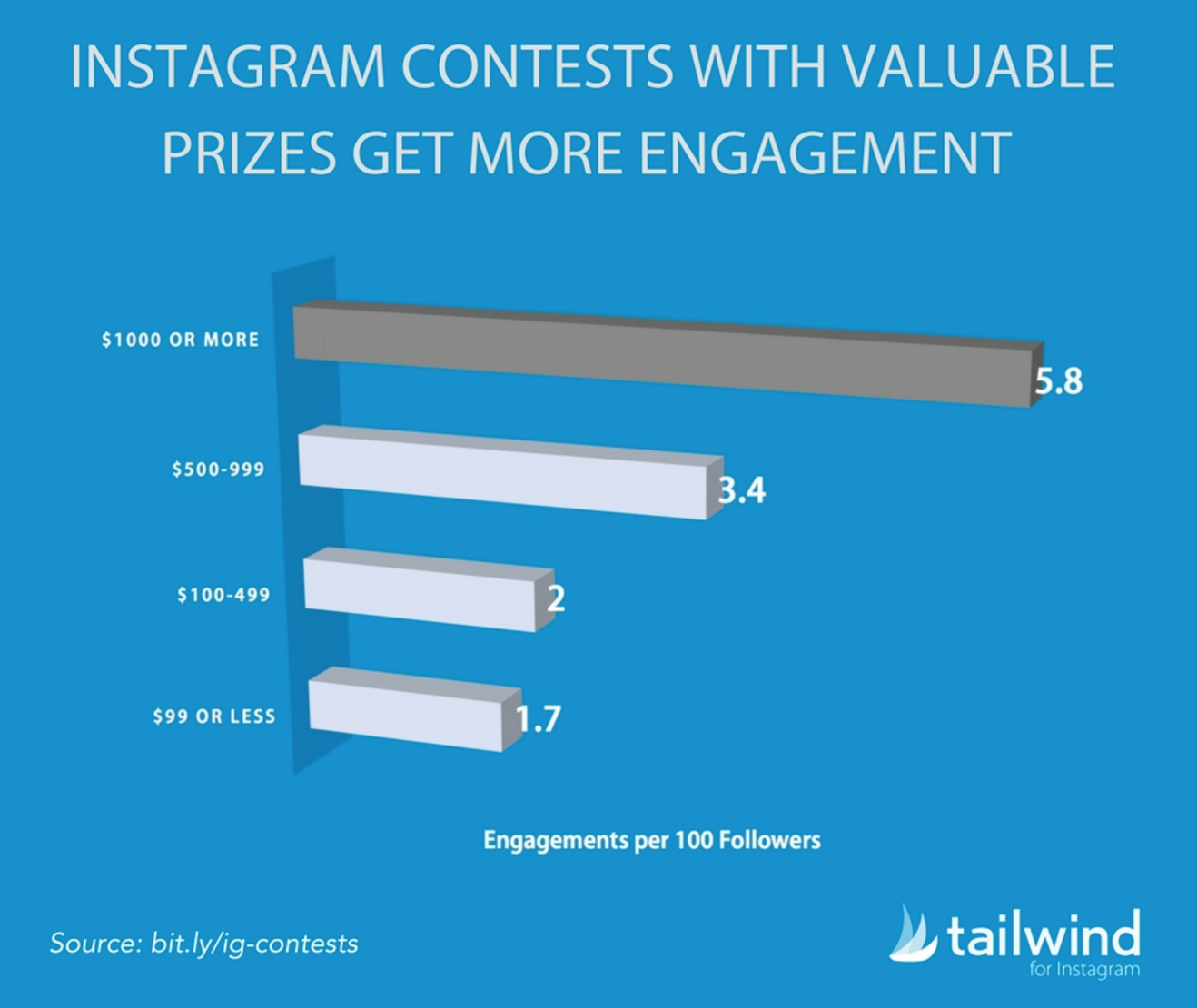
This figure is quite high when compared to the 1.7 engagements that brands enjoy when they give away prizes worth $99 or less.
If you want to give away a high-value prize, but you don’t have the funds to invest in one, consider arranging a partnership deal with another brand. Provided that you have a large enough follower count, there will be brands that are willing to provide a prize for your contest in exchange for some promotion.
The way you promote the brand that provides the prize should be low-key. In the description of the contest, simply mention that the contest is sponsored by a particular company.
This Instagram post shows how you can pull this off.
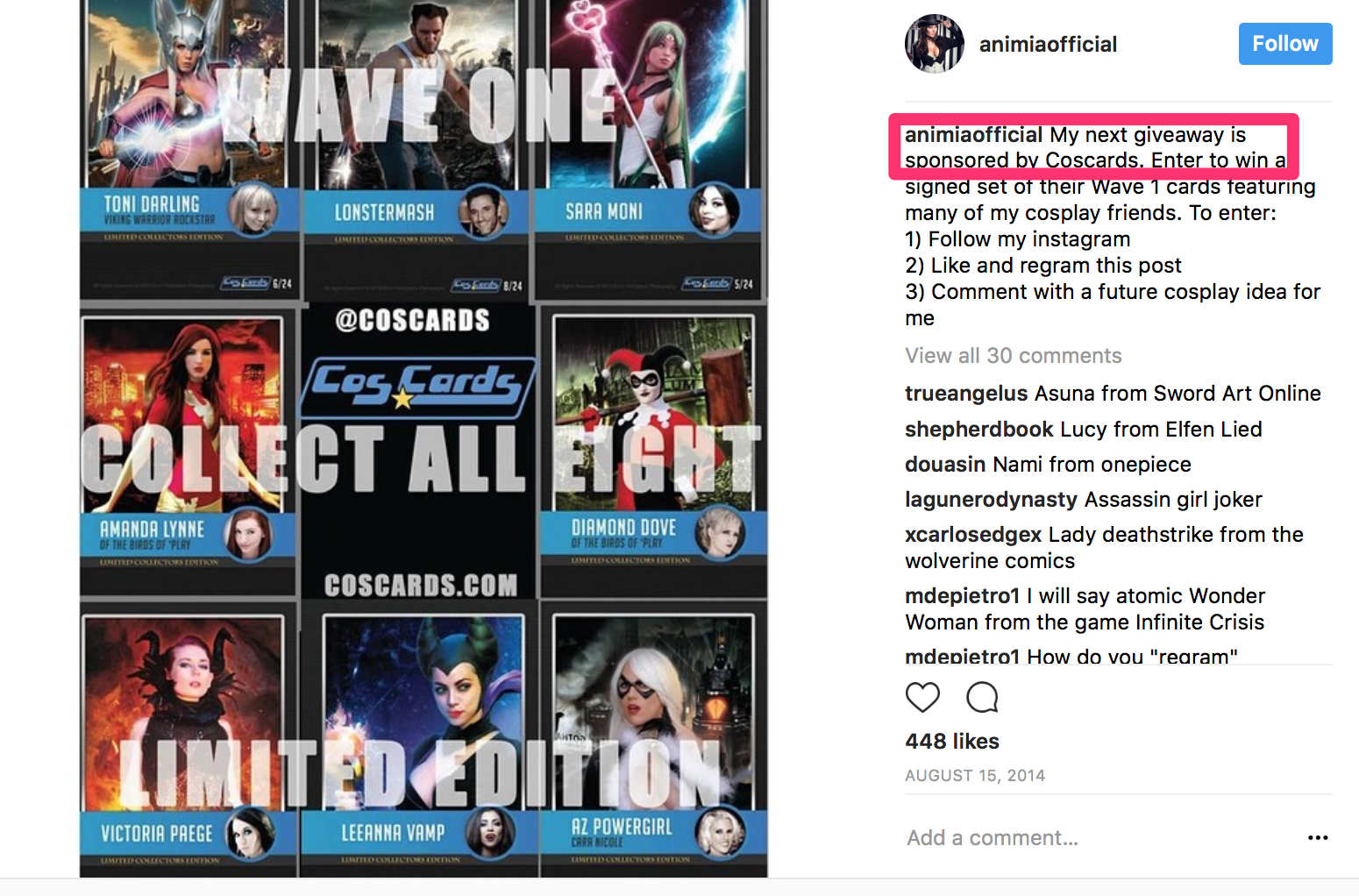
You also need to put some thought into how you’re going to announce the contest.
It’s a good idea to use a custom image within the post that announces the contest.
Here’s an example of how you can do that.
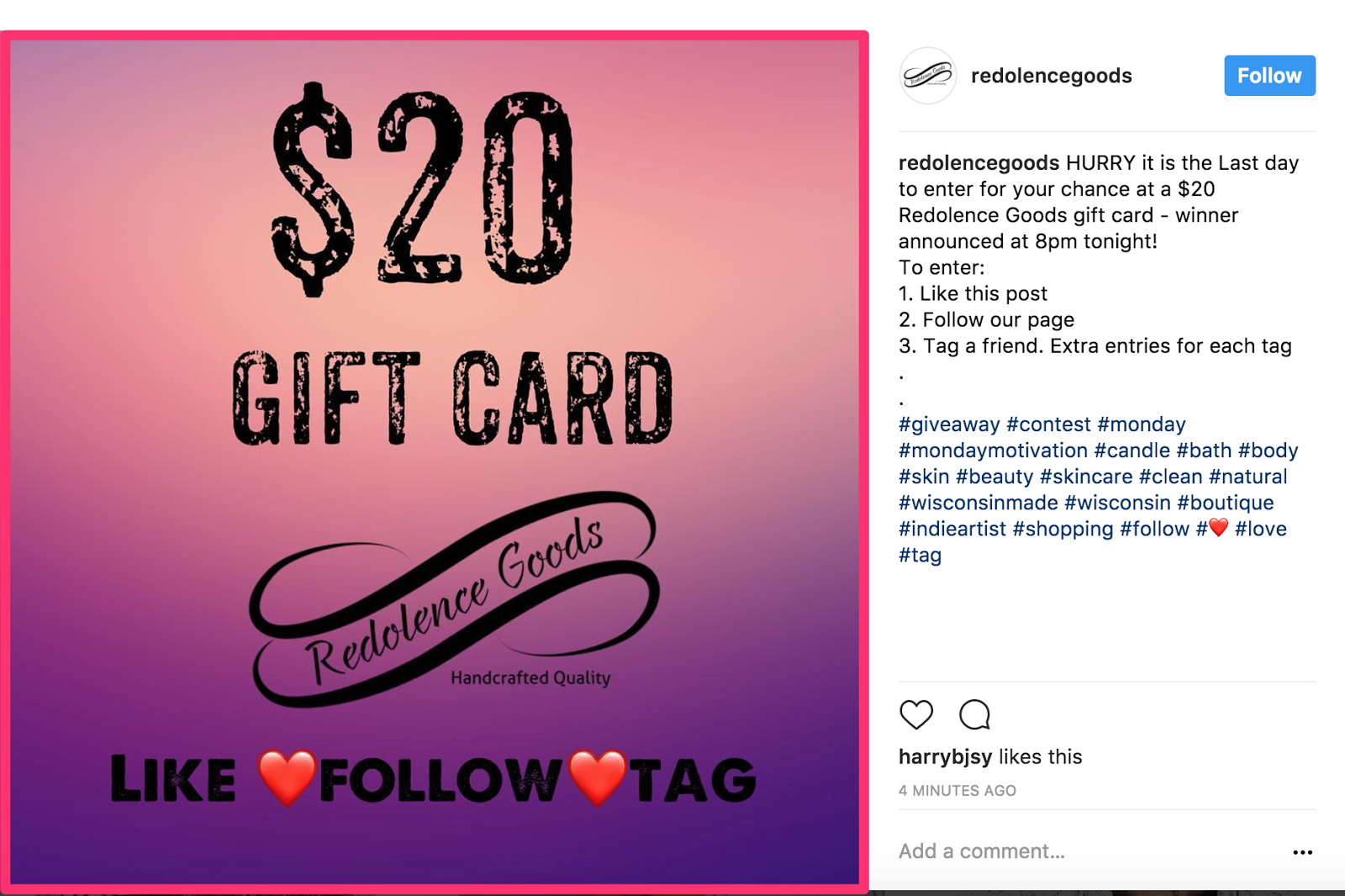
As shown above, there’s also the option of adding the terms of the competition to the image, too.
With all of that out of the way, let’s check out some of the contest ideas you can use.
Instagram Contest Idea #1: Tag to Win
The tag-to-win contest idea is nice and straightforward.
All you’re doing is asking people to tag a friend in the comments section so that they can enter the contest, as well, and become eligible to win the prize.
This contest format does a great job of improving your profile’s organic reach.
That’s because once people are tagged by someone, they’ll likely receive a notification.
These people will then check out your profile and potentially become a follower.
They may also tag others. This will create a viral feedback loop, bringing more people into the competition.
To increase the impact of this feedback loop, you can also ask people to follow your account in addition to tagging someone.
Here is an example of a brand that uses this strategy.

If you want to be brave, you can ask people to tag two people. This, again, increases the potential reach of your contest.
The contest below shows how this can be done.
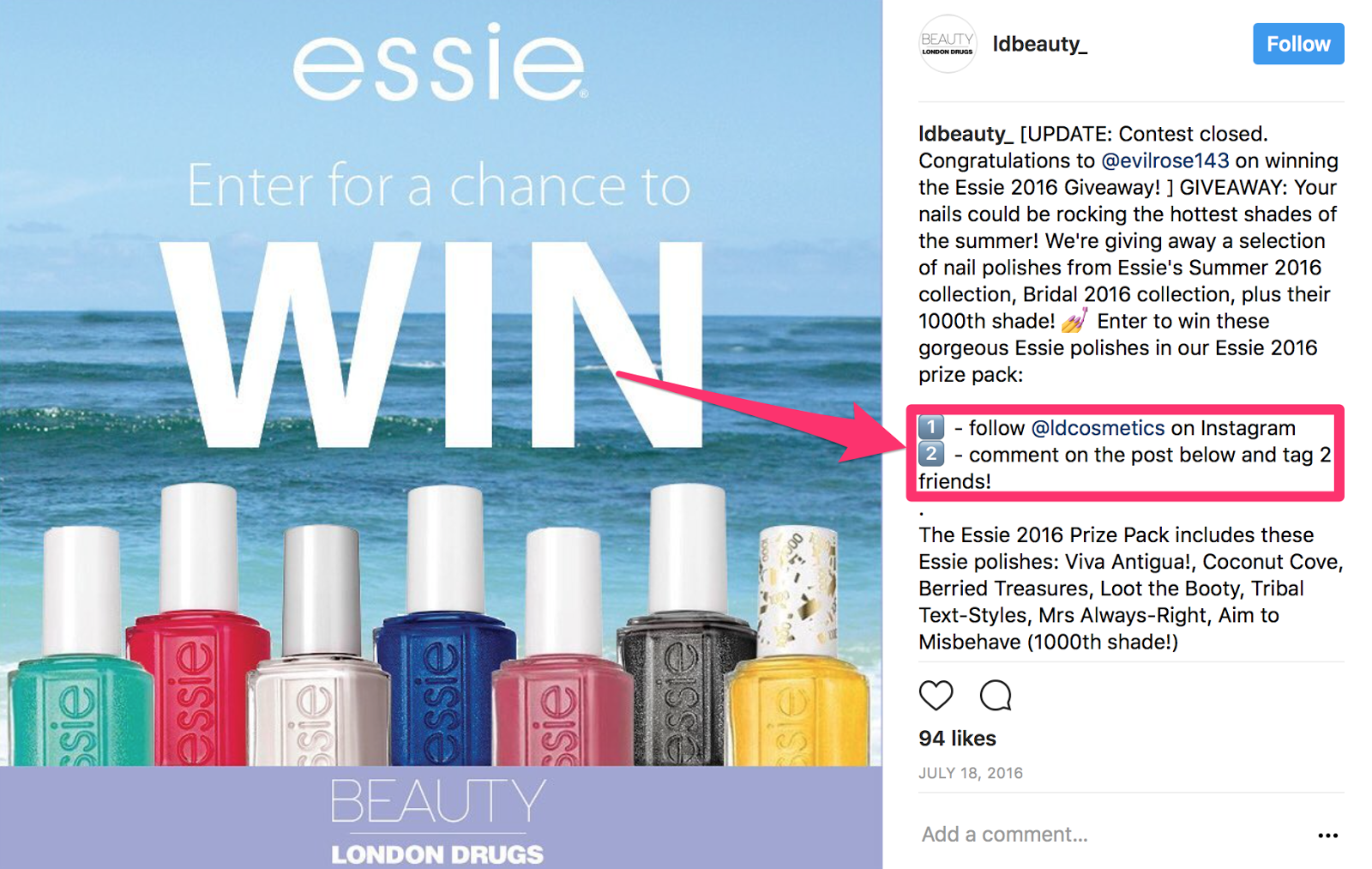

Once the competition is over, pick someone at random from the comments section. You can use an automated system to do this so that the contest remains objective.
If one of the entry conditions is to follow your profile, cross-reference the winner’s account with your follower list to make sure that everything is in order.
An alternative take on this format, the ‘nominate a friend to win’ contest, can work equally well.
Instead of asking people to randomly tag someone, you can instead suggest that they tag someone they believe deserves to win.
With this kind of format, the winner of the contest will be the person who has been tagged, and not the person who left the initial comment.
Instagram Contest Idea # 2: Like to Win
With this Instagram contest, you ask people to like your content if they want to enter the contest and have a chance of winning.
You can even use the phrase ‘double-tap to win’ since, on the Instagram app, double-tapping a photo automatically likes it.
There’s also the option of asking people to like your brand on Facebook, making it easy to increase the visibility and, therefore, the impact of your contest.
If you want to boost your follower count, mention that people also need to follow your profile if they want to be eligible to win.
Here’s an example of how that can be done.

This profile has used the combination of asking people to follow and like, thereby increasing the potential engagement this contest can produce.
Instagram Contest Idea #3: Selfie Contest
Instagram is arguably the home of selfies, so this kind of contest is a great match for the platform.
It’s a type of contest that works particularly well with products.
With a selfie contest, you ask people to post a picture of themselves while they’re using your product, or with the product somewhere in the background.
This contest format is especially useful for a business because it helps show potential customers how a product can be used. It’s an excellent form of user-generated content.
When writing the description for a selfie contest, create a unique hashtag and then ask people to use this hashtag whenever they post their photos.
You can find the pictures people have uploaded for this contest by searching for the hashtag on Instagram.
At the end of the contest, pick the picture that you think is best.
Make sure that, when you create the rules for a selfie contest, you add that you might use the content at a later date.
User-generated content can provide an excellent source of social proof. Long after the contest is over, you can repost the content that the contest generated.
Here’s an example of how you can do a selfie contest.
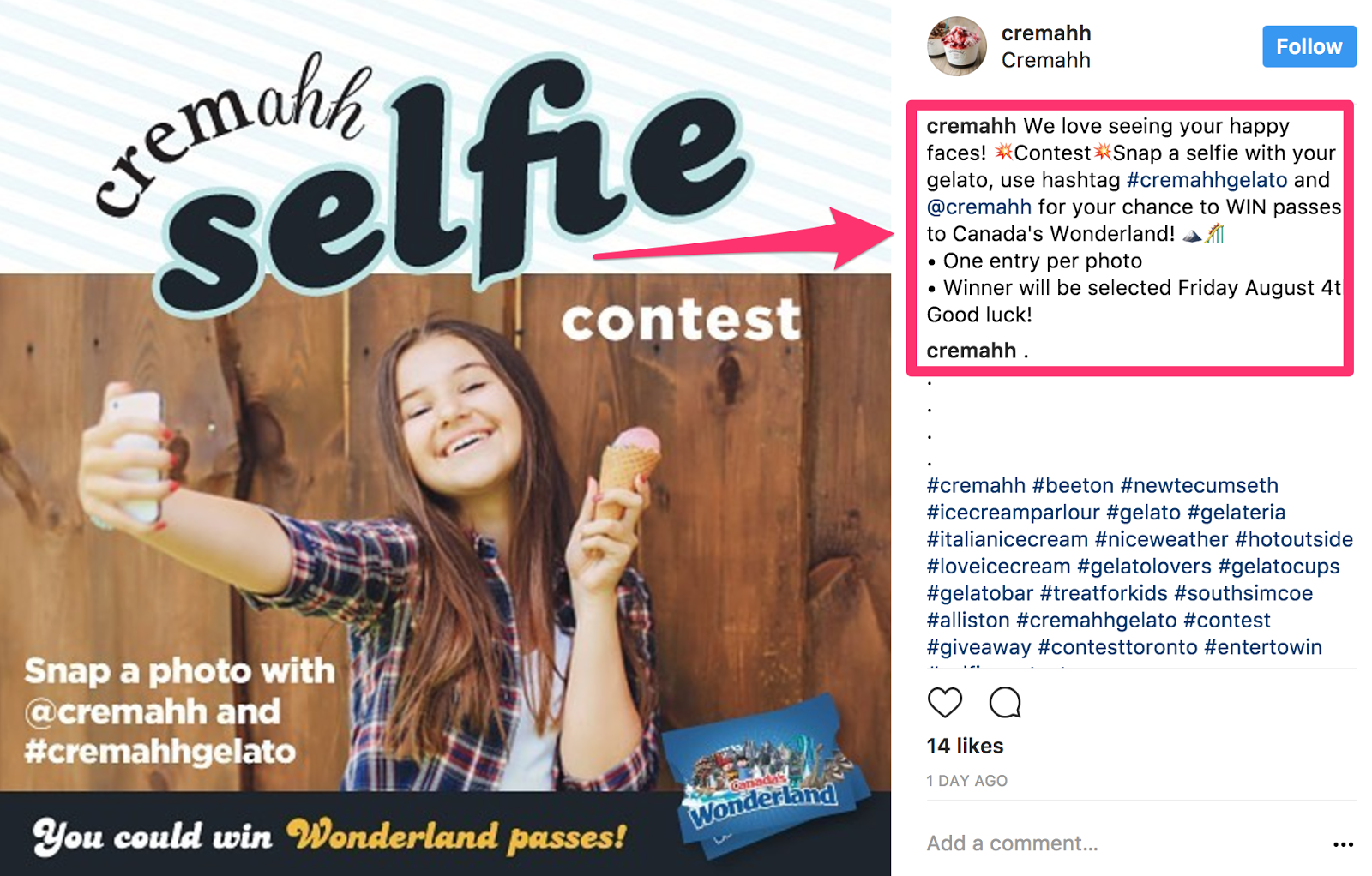
Similar to the ‘like-to-win’ example from earlier, you can combine the format of the selfie contest with the other contest formats we’ve already covered.
You could mention that people need to like the post that announces the contest as well as posting a selfie.
Instagram Contest Idea #4: Photo Contest
The photo contest is closely related to the selfie contest we just covered.
The difference, however, is that you’re not asking people to take a selfie. Instead, they can take any type of photo they wish.
Like before, you ask people to submit photos using a relevant hashtag that you create.
You then search Instagram using this hashtag so that you can find a winning photo.
With this kind of contest, you don’t always have to offer a physical prize for the winner.
You can just let people know that the prize is that you’ll feature their content on your profile.
Here’s an example of a photo contest of which relates to a Boston News channel.
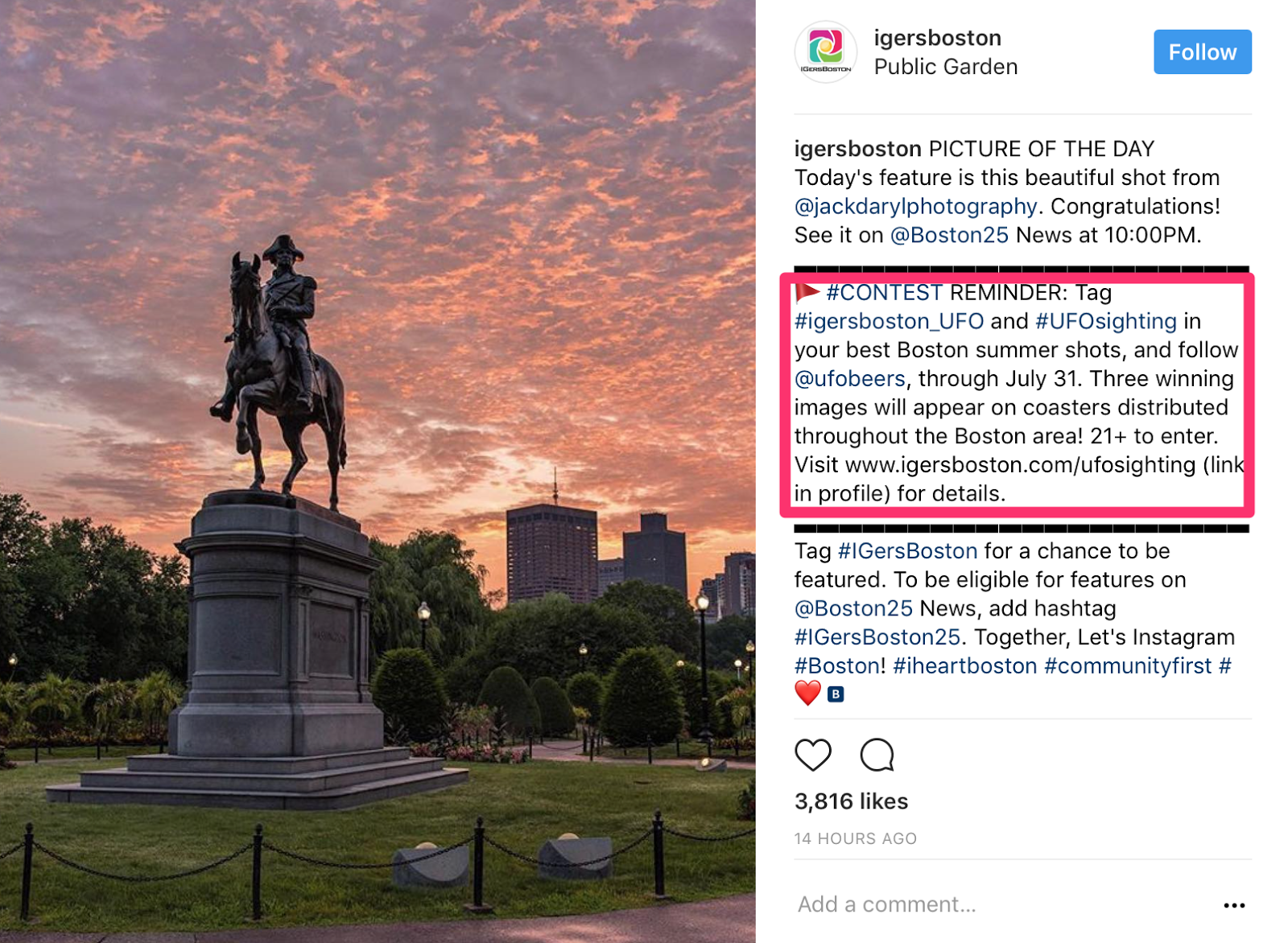
Here’s another one from the Empire State Building Instagram account.
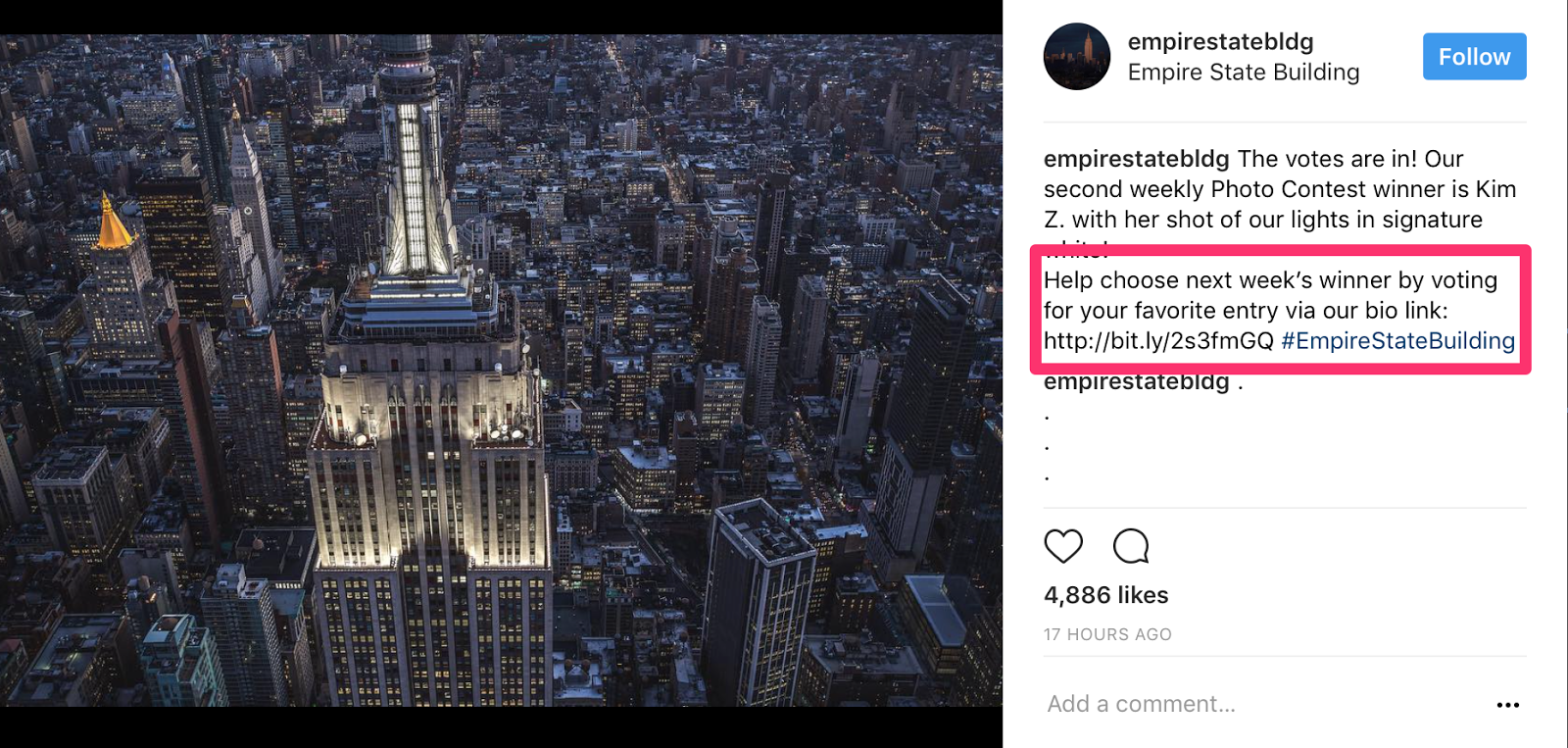
It may be that you have a product or niche that is perfectly suited to photo contests. GoPro is an example of such a product.

If so, you should place a special focus on running photo contests.
That’s because this format will be especially easy to pull off while also providing you with an abundance of user-generated content that you can feature on your Instagram account.
Instagram Contest Idea # 5: Voting Contest
A voting contest revolves around the following steps:
- You ask people to upload a piece of content alongside a designated hashtag. You also ask people to tag your profile in the description.
- Your followers then search Instagram using this hashtag and vote for the one that they think is best. The easiest way to collate votes is to ask people to like the photo that they think should be the winner.
- The person with the most likes is deemed the winner of the contest.
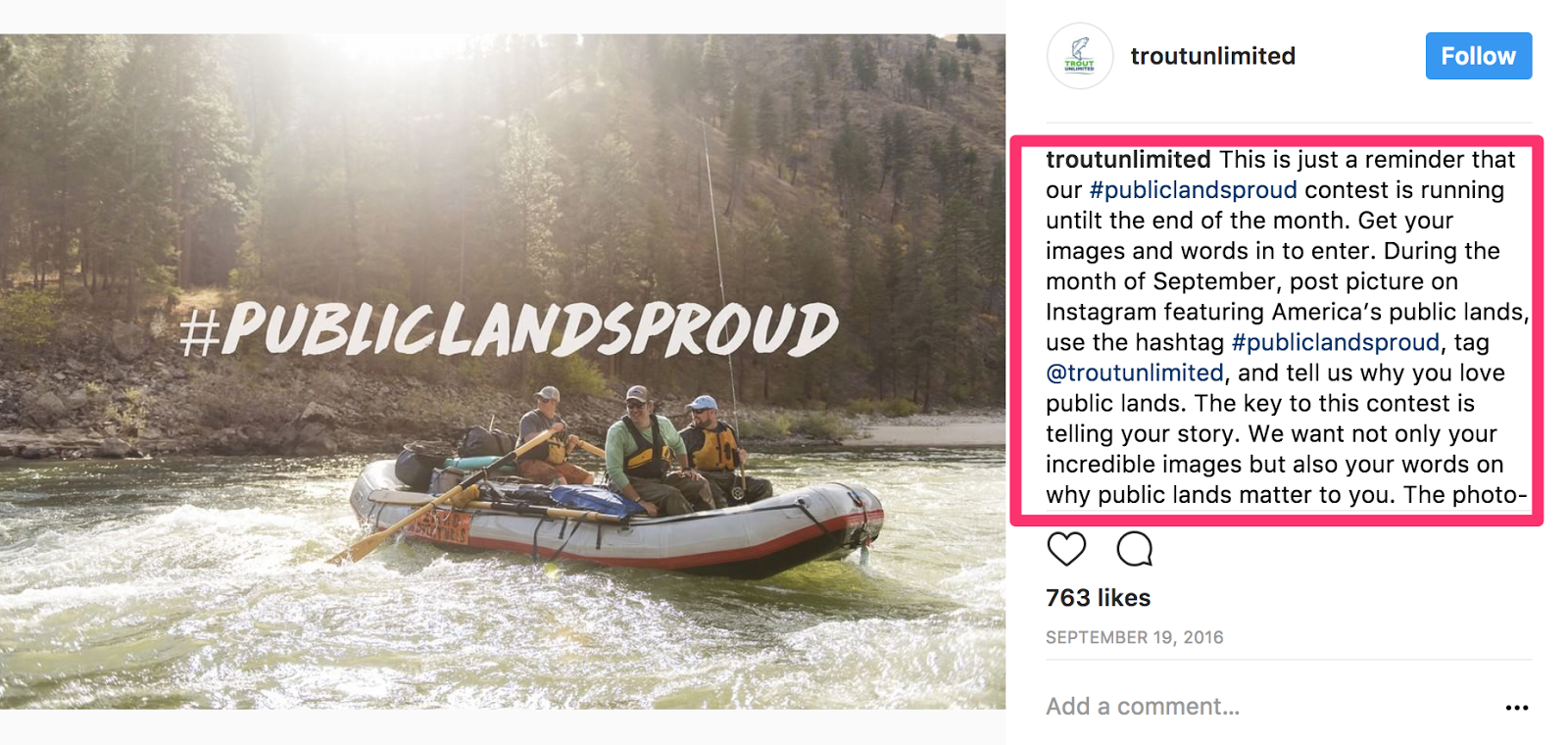
This contest format is great at generating engagement because you’re asking people to take a lot of social actions. Plus, the people who enter the contest will promote their own entries through their social channels.
However, you could argue that such a format is potentially asking too much from people.
Because of this, you may want to use this contest format only when you have a highly-engaged audience that cares about your profile and its content.
With that being said, another way you can run this contest is by having people submit photos first, and then only you find them using the assigned hashtag.
Based on what you find, you pick 3-5 finalist images and host them on your own profile.
You then ask your followers to like the one that they think is best, and the photo with the most likes wins.
This approach can help you achieve great results with a voting contest without asking too much of your followers.
Here’s an example of a profile that is doing something similar, but instead asking people to submit the photos to the host’s account directly.

Here’s a bit more context.
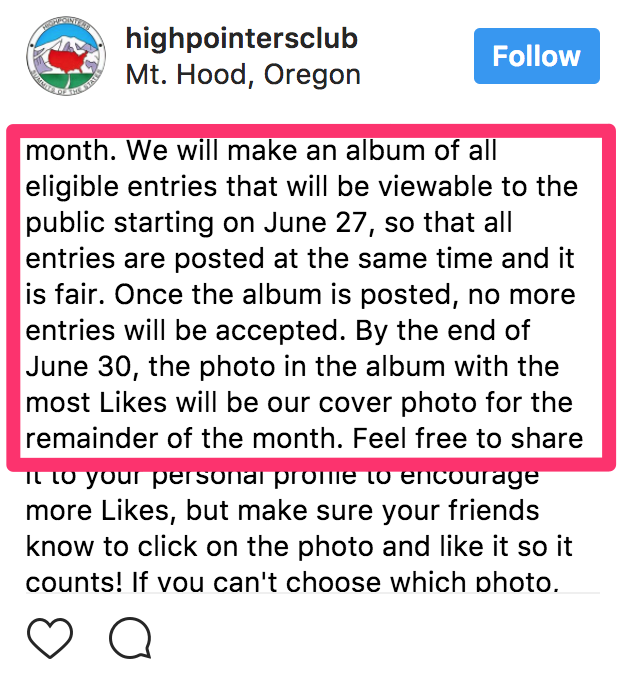
Here’s an example of how someone might post their own content in the hopes of obtaining a vote.
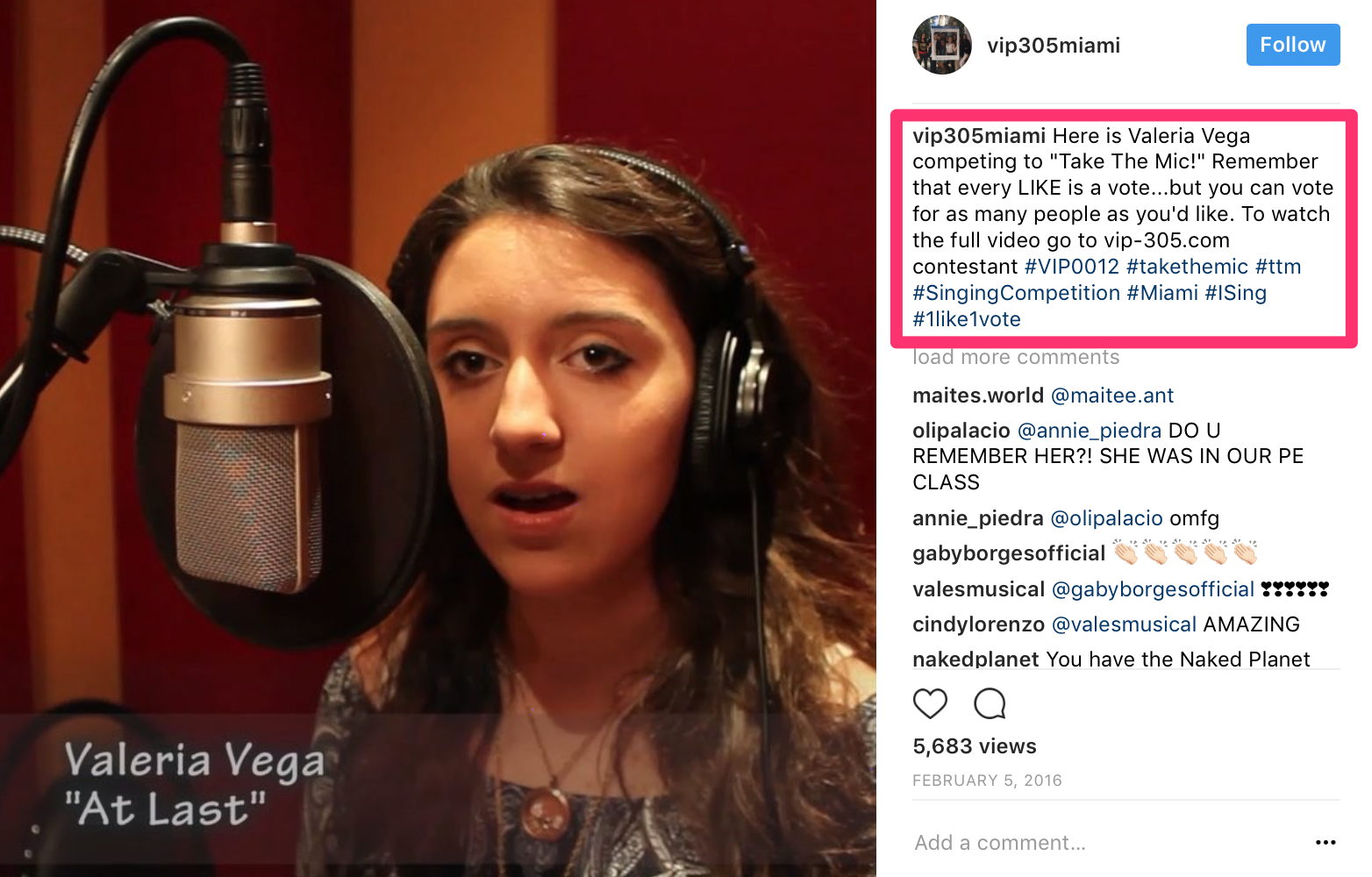
When running this kind of competition, you can also ask people to post their contest content to Facebook, as well.
Then you can count the likes that people have gathered on that platform and combine them with what they’ve achieved on Instagram.
Doing things this way can help expand the reach of your contest, improving your ability to generate brand awareness.
Instagram Contest Idea # 6: Caption Contest
A caption contest is a contest in which you ask people to caption a photo that you’ve uploaded.
From that point, you can either:
- Pick the best caption using your own judgment, or
- Tell others to like the best caption.
The caption with the most likes is the winner.
While the second option can be a good way to engage your audience, the first option can help prevent people from artificially inflating their likes.
Here’s an example of a caption contest:
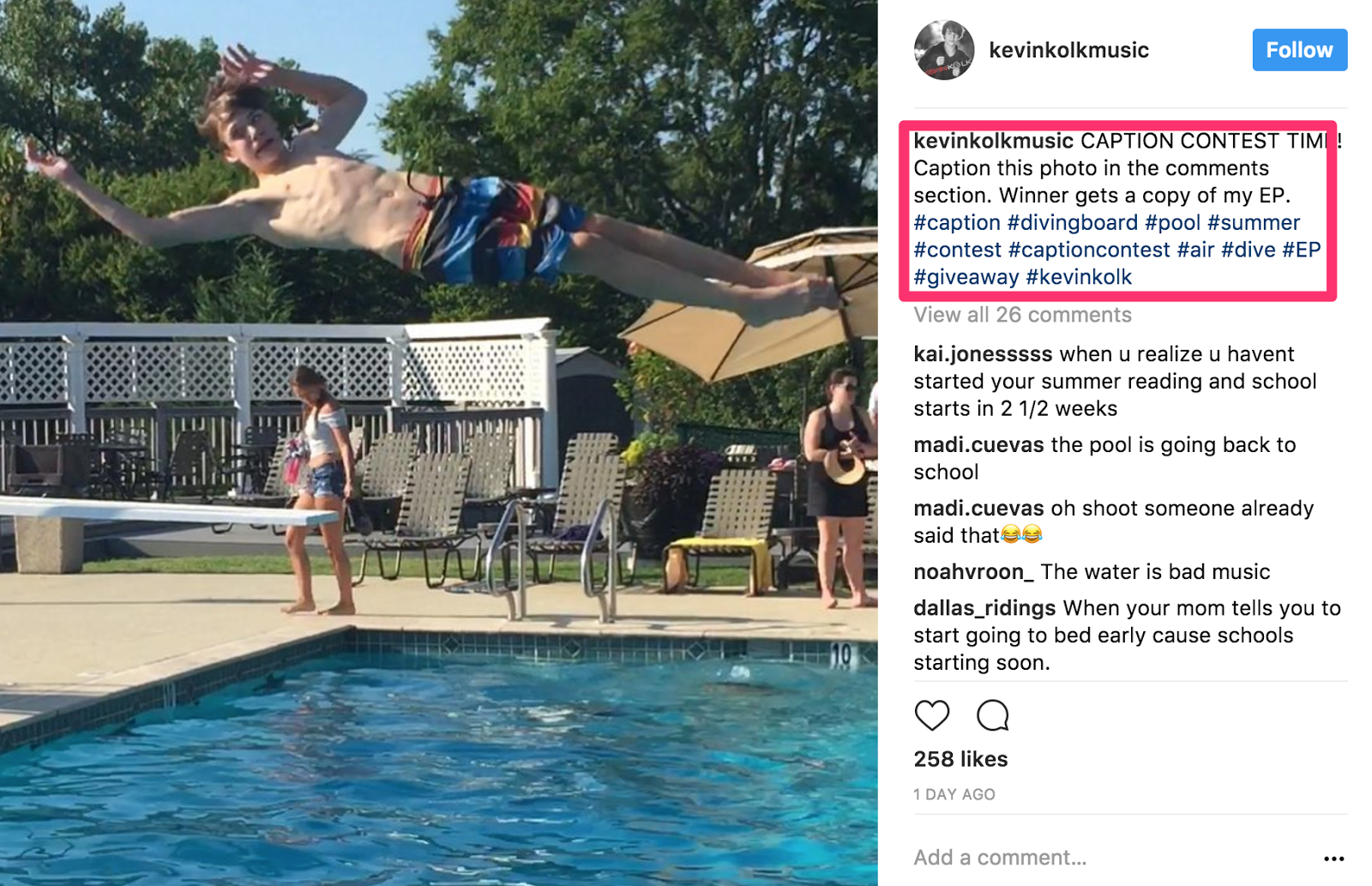
You may want to edit the image you use to announce the contest so that it highlights the fact that you’re in need of a caption.

The speech bubbles in the above post are a good example of how this can be done.
Instagram Contest Idea # 7: Challenge Contest
If you’re in a position where you need to put together a contest in a short amount of time, a challenge contest can work wonders.
With this contest format, you just need to come up with a simple challenge for people to meet, and the person who solves the challenge wins.
The challenge doesn’t need to be complex. In fact, simpler contests generally draw more social engagement and participation.
The post below shows how this can be done.
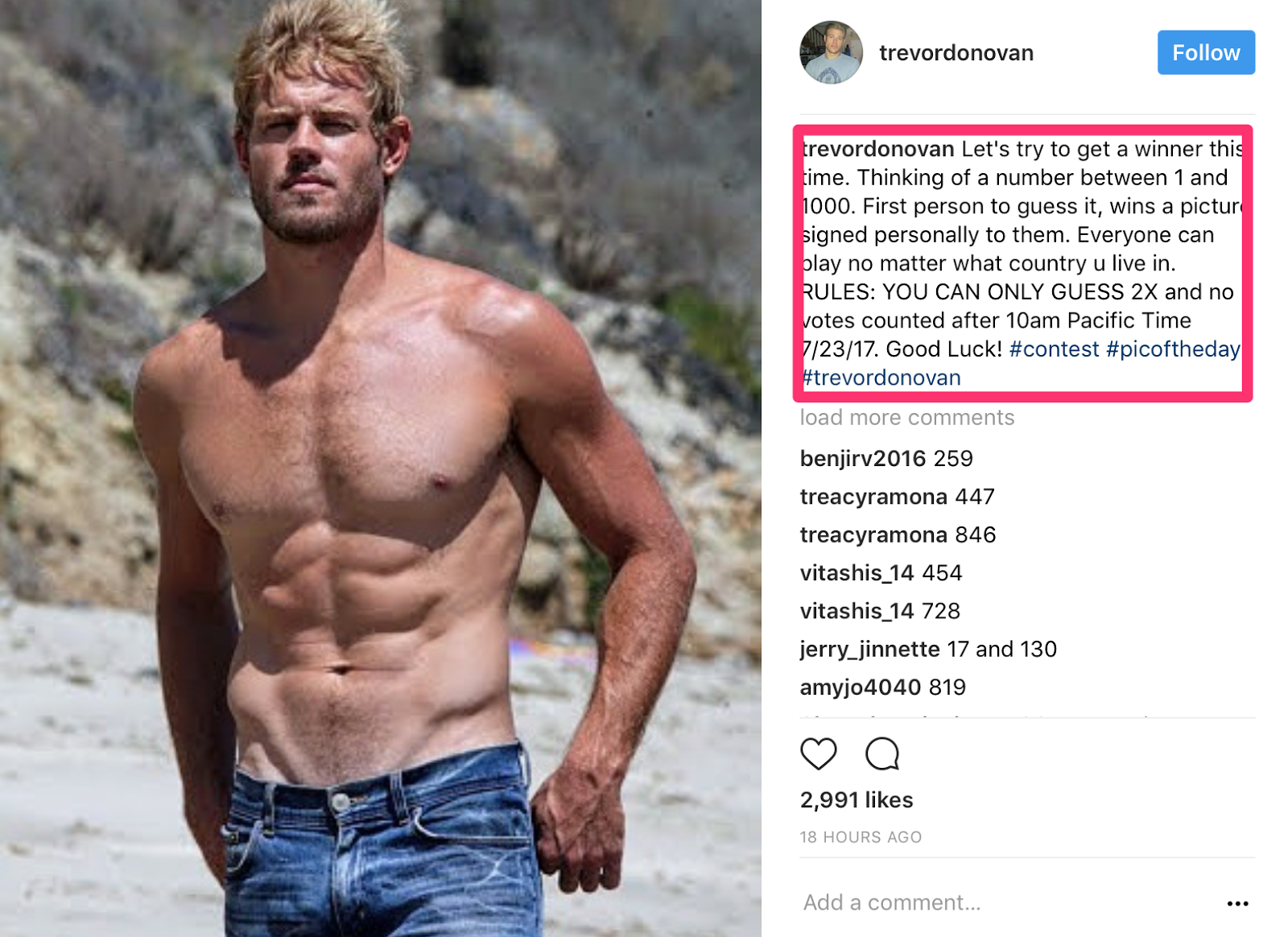
All that’s being asked of in this contest is that people guess which number the account owner is thinking of.
It’s simple and fun. The spontaneous feel helps to increase the authenticity of the profile, too, which helps boost long-term engagement.
Here’s another example, this time using a ‘guess the marbles’ challenge.
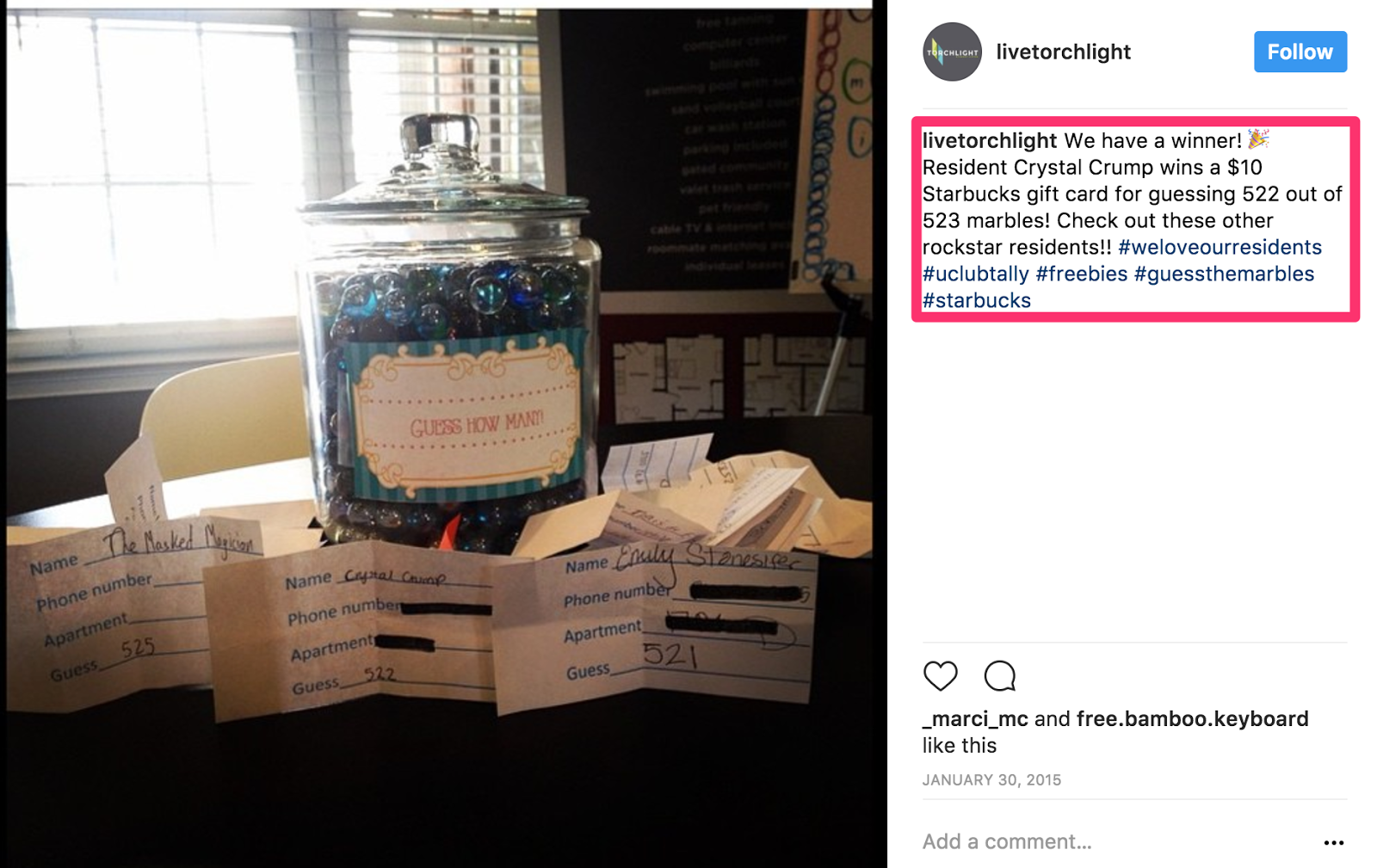
This contest format is simple and low-effort, making it a good choice for anyone who is new to running contests on Instagram.
Conclusion
You should now understand how to use Instagram contests to grow brand awareness.
As soon as you run your first contest, you’ll find that the whole process is a lot of fun. It’s also probably much easier than you expected.
Decide on a contest theme, create the rules, and establish a dedicated hashtag. Increase user engagement by cross-posting the contest on Facebook.
If you’re feeling nervous about setting up your first Instagram contest, get in touch and we can help you strategize (and assist you with your other digital marketing efforts).
If you can encourage people to invite their friends to participate in the contest, do so. The more people who see your contest and content, the better.
Do you have any tips related to running Instagram contests?
How to Find and Fix 404 Errors
Do you know what sucks when browsing a website? Getting a 404 page. It doesn’t matter if they mistyped the URL or the page no longer exists. 404 errors can seriously harm your brand and negatively impact your SEO by making it harder for search engines to crawl your site. That means finding and fixing 404 …
The post How to Find and Fix 404 Errors first appeared on Online Web Store Site.
The post How to Find and Fix 404 Errors appeared first on ROI Credit Builders.
Gravitational (YC S15) is hiring a remote web developer
Come work with us, we’re a pleasant group of people and we’re remote-friendly!
Own everything you see on gravitational.com, both the front-end and the (currently non-existing) back-end.
Specifically, we’re looking for a strong engineer to manage our web properties for Gravitational. You will be charged with keeping us up to date with the latest web technology and implementing pixel perfect designs that run smoothly on Desktop and Mobile devices. You should have very strong technical skills especially in the areas of Javascript, react, CSS, and HTML. We expect you to enforce strict web standards and watch over website SEO using the latest tools.
Apply here:
https://jobs.lever.co/gravitational/4914bfe9-46ed-4711-af70-…
Or just shoot an email to CEO: ev@gravitational.com
Comments URL: https://news.ycombinator.com/item?id=24434206
Points: 1
# Comments: 0
Lazy Lantern (YC S19) is hiring senior back-end and full-stack engineers
Article URL: https://angel.co/company/lazylantern/jobs
Comments URL: https://news.ycombinator.com/item?id=24059047
Points: 1
# Comments: 0
The post Lazy Lantern (YC S19) is hiring senior back-end and full-stack engineers appeared first on ROI Credit Builders.
New comment by amitpatex in "Ask HN: Who wants to be hired? (May 2020)"
Location: Ahemdabad, India
Remote: Only
Willing to relocate: No
Technologies: Ruby on Rails
Résumé/CV: https://www.linkedin.com/in/amitsavani
Email: amitsavani [a] gmail
I am developer for about 14 years. I love writing software and teach how to write good software, passionate about creating web apps using Ruby on Rails. Carrying entrepreneurial bug that make me restless.
The post New comment by amitpatex in "Ask HN: Who wants to be hired? (May 2020)" appeared first on WE TEACH MONEY LIFE SELF DEFENSE WITH FINANCIAL GOALS IN MIND.
The post New comment by amitpatex in "Ask HN: Who wants to be hired? (May 2020)" appeared first on Buy It At A Bargain – Deals And Reviews.
Broncos' Miller says he's now 'negative' for virus
Denver Broncos linebacker Von Miller tweeted that he was negative for the coronavirus on Thursday, two weeks after announcing he had been diagnosed with the virus.
The post Broncos' Miller says he's now 'negative' for virus appeared first on Buy It At A Bargain – Deals And Reviews.
New comment by nbnd in "Ask HN: Freelancer? Seeking Freelancer? (February 2020)"
SEEKING WORK | PACIFIC STANDARD TIME | REMOTE OR SEATTLE
I’m a front end developer with four years of experience. I’m looking to pick up additional contract work on a short or long term basis. Resume available upon request.
Skill highlights: JavaScript, CSS, HTML, React, Webpack, Python, Node
Contact: northwestbased+hn@gmail.com
New comment by jph98 in "Ask HN: Who wants to be hired? (January 2020)"
Location: Bristol, UK
Remote: Yes
Willing to relocate: Yes
Technologies: Javascript, React (+ Native), Python, Java
LinkedIn: https://www.linkedin.com/in/jonathanholloway/
Blog: https://medium.com/@jonathan.holloway
Résumé/CV: https://docs.google.com/document/d/1D7LpdfSMI8qTdp1YwBT6Sjqp…
Email: jonathan.holloway@gmail.com
Software engineer, data engineer, product manager, engineering manager/CTO looking for contract work (remote or SW England based) primarily. Relocation eventually for the right role.




